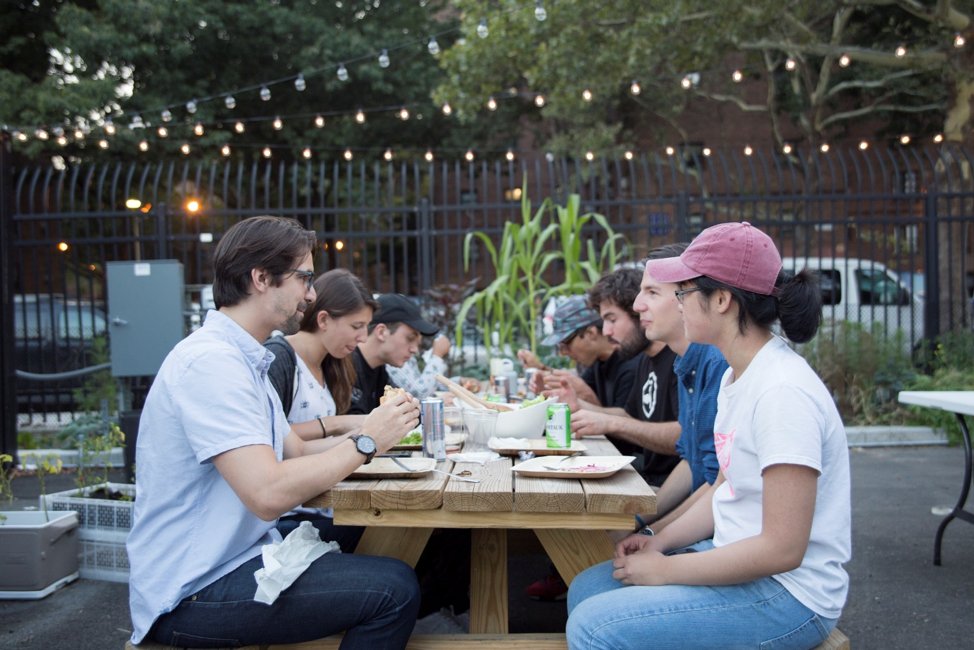These Next Generation Farmers Start at the Root to Grow Sustainable Cities
Welcome to the Global Goals, Local Leaders series, where we highlight innovative American businesses that are acting as local leaders to support and promote the United Nations’ Sustainable Development Goals – also called Global Goals!
Company: Square Roots
Sustainable Development: Goal #11 Sustainable Cities and Communities
Last week, the city of San Francisco hosted the inaugural Global Climate Action Summit, bringing together local, state, and national leaders across all sectors and from each corner of the globe to make bold commitments on climate action. Throughout the summit, individuals from public and private sectors grappled with countless challenges brought on by climate change. One of many themes that commonly emerged: How do our existing food systems and distribution models impact our climate? And how is climate change affecting our food systems and agriculture?
For this edition of Global Goals, Local Leaders, we took these questions and zoomed in on Square Roots, a Brooklyn-based urban farming company using indoor vertical farming systems to grow more food with less resources and less environmental impact. We tapped Square Roots’ CEO + Co-Founder Tobias Peggs to explain how his innovative local leadership turned thriving U.S. business supports Sustainable Development Goal #11: Sustainable Cities and Communities.
The United Nations’ Sustainable Development Goal (SDG) #11 focuses on building and fostering urban environments that are inclusive, safe, resilient and sustainable. How does Square Roots play a role?
Tobias Peggs: Square Roots is an urban farming company based in the heart of Brooklyn. We grow nutritious food, year round, using indoor vertical farming systems. Our farms are non-GMO, pesticide-free, and use 90% less water than their outdoor equivalents.
We strive to make cities and communities more inclusive, resilient, and sustainable by continually working to improve the technology in our farms to grow more (and higher quality) food, with less resources. This gives the farmer more time to connect with customers and local communities.

Our first farm in Brooklyn is just a subway ride away from over eight million New Yorkers, making it easy for urbanites to get connected to their local urban farmer. We hold workshops, open community tours, and pop-up markets for foodies, tech-lovers, and passionate real food advocates. The farm is a space to connect with community and share thoughts with other like-minded individuals. And at the heart of it all are the farmers.
How does Square Roots advance their mission to strengthen and advance local communities through the power of technology and entrepreneurship?
Peggs: Our mission at Square Roots is to bring local, real food to people in cities around the world by empowering a new generation of leaders in urban farming. Our thinking is: the more of us working to shape the future of food, the better.
Central to that mission is our Next-Gen Farmer Training Program — a year-long program where young people can learn plant science and how to grow food in our cutting edge farms. Participants get hands-on experience with every aspect of the Square Roots business, from seed-to-sales.
Participants also take part in structured business projects (to learn about entrepreneurship frameworks), and community building initiatives (focused on inspiring even younger generations to get more connected to their food). We believe that Farming, Business and Community Building are vital areas to understand on the pathway to becoming a future leader in urban farming – and our program offers incredible exposure to all three.
Alumni from the Square Roots program have gone on to start their own urban farming businesses, take incredible jobs at other forward-thinking companies in urban agriculture, and moved into permanent positions on the Square Roots team as we keep growing. The program really puts participants at the forefront of indoor urban farming—and is completely unique.
Why is the goal of creating sustainable solutions for cities so important to your company? How are you teaching/equipping the next generation?
Peggs: Many of us get our food from the industrial food system today. This is a system that ships in high calorie, low nutrient food, often from across the globe. The results are awful. It’s harmful to the health of the planet and its populations, and leaves us completely disconnected from the people who grow our food.
But the good news is there’s incredible opportunity for the next generation to re-envision a food system that implements responsible farming practices, leverages new technologies, works together to value everyone from the farmer to the consumer, and rebuilds the connections between people and their food.
We launched Square Roots two years ago to start playing our part in this new system. We believe it’s essential for leaders in urban agriculture to understand sustainable and responsible business models—and also how to strengthen communities through food. So, built into our Next-Gen Farmer Training Program are two multi-month project-based learning experiences. The Business Project introduces entrepreneurial frameworks and further develops farming business knowledge; the Community Project is focused on creating more pathways for younger generations to get connected to their food.
Next-Gen leaders in urban farming understand the importance of equally-weighted social, environmental, and financial success. We’re a young company ourselves, and we are building these measurements into every aspect of our business. Throughout the year the farmers are involved in the entire process.
How does Square Roots support urban populations around the world?
Peggs: We’re a young company – barely two years old – and our operations are focused on New York right now. However, the wonderful thing about New York is that it can provide a template to help us figure out successful urban farming models in major cities across the globe. Our expansion plans are U.S.-centric right now, but we are already talking with parties who want to take us global, which is exciting – and also proves that consumers’ demand for local, real food is moving past being a trend and becoming a real way of life.
Having said that, our Next Gen Farmer Training Program is open to anyone who can legally work in the US. About 10% of our applicants are international.
What should we be on the lookout for next as Square Roots continues its work to increase and promote resilient communities through urban farming?
Peggs: We’re doing a lot of work on our farming technology right now – it’s very exciting. The Square Roots farms feel almost like iPhones to the farmers. They are very intuitive and a delight to use. But under the hood they’re really operating a sophisticated supercomputer to help the farmer grow amazing food.
For example, the farms have programmable climates – meaning we can make the farm replicate any region in the world, and then grow food from that region – but do it all in the same neighborhood as the end consumer. Essentially, we’re building a platform for distributed, controlled-climate farming – enabling local farmers to grow for local retailers, in city centers, all year round, all around the world. The end result is fresh, locally-grown, nutritious food for everyone, 12 months a year, in a way that removes the need to ship food across the globe (as we do today) while significantly reducing the risk of large scale food safety scares (e.g. e-coli outbreaks). It’s very exciting to work on.
Want to learn more about what the world is doing to foster sustainable cities and food systems by taking action on climate change?
Watch what happened at the 2018 Global Climate Action Summit in San Francisco.
Day 1:
Day 2:




